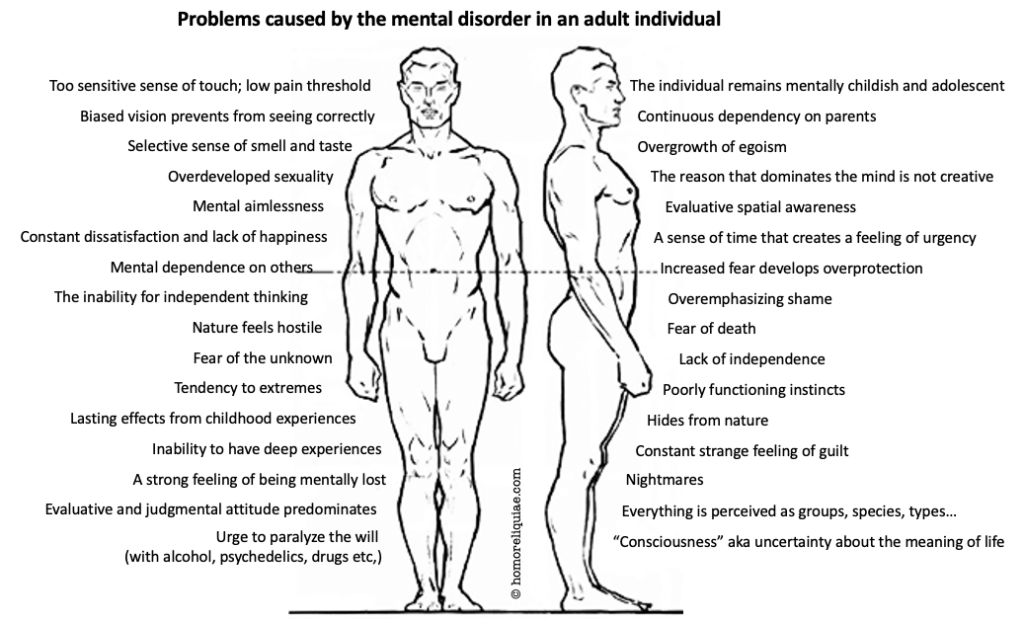I’ll shortly describe the problems that an unsuccessful transformation related to mental ageing causes in an adult individual. The source of the problem is almost impossible to spot because nothing happens in our minds as we move from adolescence to adulthood, even if that is just when a significant change in psyche should take place. Nevertheless, these little tips tell us about the tiny but significant mental defect we all inherited.
However, something happens. When we break away from our childhood, the feeling of having parents weakens and no longer maintains a regular order of life (which makes it meaningful). We gradually lose our childlike faith in the authority of our breeders. We may feel liberated, confused, or anxious, depending on our childhood experiences.
The role of consciousness is still to control our reactions by altering external stimuli. Therefore, it will not change, even if our independence increases. Also, emotions, which are reactions and products of this control system, remain the same.
The external senses do not function properly, and the individual is overprotected from his environment in the same way as a child is. Emotions continue to shape reactions. He overreacts to almost everything because he does not know how to evaluate the relationship between things correctly. The mind does not function properly because cognition and volition are too dominant. Survival is still based on reasoning rather than instincts. The ego transforms into separateness and individuality.
We can describe problems in the adult individual in many ways. And they can go unnoticed, and one can adapt to them without question. However, most people are bothered by them. Please note that the problem of mental disorder happens only with adults; children grow correctly. The growth disorder of the psyche occurs in two ways. First, it appears in the mind, where volition, cognition, and memory still dominate, even though they should give way to instincts. On the other hand, it is identifiable in the external senses, some of which are hypersensitive, and some function poorly. The senses work just right, but the mechanism that modifies sensory perceptions doesn’t adjust appropriately. Some symptoms are listed in the picture above.
Our sensory information is heavily modified
Our senses are a means to tell us what our living environment is like: what it looks like, sounds, feels, smells and tastes so that we can react to it safely. Senses perceive this data through various stimuli. Each sense is associated with its sensory organ. The five basic senses (sight, smell, taste, hearing and touch) are related to the perception of our external environment, but we also have others that perceive our body condition. Depending on how you want to count them, there are between 14 and 20 different in the human body.
Our external senses do not function properly, and we are overprotected from our environment in the same way as when we were children. Emotions continue to affect our reactions. We overreact to almost everything because we do not know how to evaluate the relationship between things. Our mind does not run correctly because our cognition and volition are too dominant. Our survival is based on reasoning rather than instincts. Our egos have intensified into individuality and separateness.
Adult senses have a unique feature: our bodies still control and modify the stimuli they receive and then send them to our observation as changed. Therefore, we do not experience the world around us as such. That has been known for a long time, but in discussions, it is often overlooked. However, it is not our senses that work incorrectly. Distortions are caused by the mechanism created to modify our observations. The tool was originally designed for children. There is a good and understandable reason: the child cannot cope with the uncensored and unmodified flood of external sensory stimuli. There would be too much data and too much variety. There is another reason for that: the dangers posed by a child’s curiosity. Therefore the child’s sensory world has been enormously simplified to be processed quickly and safely. The internal senses, of course, work the same way. Still, they do not need to be monitored because the information they convey is not passed on to us for consideration, and the body reacts to it automatically.
The problem is that we sense the reality around us, but we cannot experience it. That is because we have inherited the mind of the child and its protective mechanisms. We lack independence of adult of mind. We are alert, afraid, looking at things from home and the nest. We feel we belong at home, in a protected environment, not in the world. We do not see or feel our environment correctly, even though our senses receive all the stimuli it has to offer. That’s because our mind and “eyes” are adjusted for comparing things only—not experiencing them. That is why our consciousness is always an outdated picture of instant reality. When we look out, we only see what is inside our minds. Things have no value or meaning if they have no value (existence) in our minds. The external reality for the child’s mind – and modern humans – is just a tool to build the world in his mind. To experience, we should give up this inner world, but we cannot do that because the problem is probably genetic. That is why the human mind is a laboratory of attitudes and prejudices, not a seeker of reality or a producer of knowledge.




